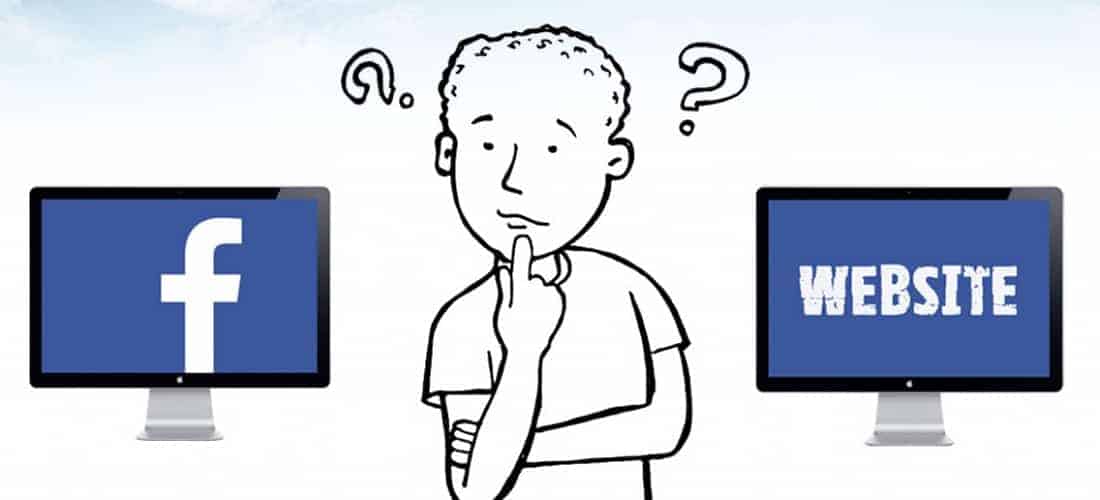Today, millions of businesses leverage the power of Facebook, making it an invaluable tool for reaching target audiences and engaging potential customers. But a pressing question arises: Can a Facebook business page replace a website? The succinct answer is no. However, this doesn’t downplay Facebook’s role in your overarching digital strategy. Let’s navigate the Facebook vs. website debate, honing in on key considerations.
Facebook vs. Website: The Potential Reach
Facebook’s sophisticated advertising algorithms empower businesses to reach the people they aim to target, marketing to potential customers who may require your services yet are unaware of your existence.
For those with a knack for social media, clever content, including videos, photos, and engaging updates, can expand your reach on Facebook. But to truly extract value from your Facebook page, it requires investment – both in terms of time and money. Even with paid advertising, the return on investment may not be fruitful in generating viable leads for your business, particularly if you’re a B2B company.
On the other hand, your website also has reach. The lion’s share of online interactions begins with a search – Google processes billions of searches every day, many of which are from people seeking your offerings. Without a digital presence, you’re already falling behind the competition. A solid SEO strategy can help your website stand out, reaching the right people who are actively seeking your services.
Standing Out from the Crowd: A Challenge and a Necessity
Millions of businesses have a presence on Facebook. With so many pages vying for attention, standing out becomes a challenge. Even with paid promotions, there’s no guarantee your advertisement will captivate your audience. Given that Facebook is a recreational platform for many, catching their attention for business purposes requires extra effort.
Investing resources in Google AdWords and SEO can more effectively set your business apart from the competition, getting your website in front of those already shopping for what you offer. Once they click on your website, you have their attention, even if it’s fleeting.
Credibility and Professionalism
Suppose someone stumbles upon your business page on Facebook and is intrigued by your products or services. What’s their likely next step? They’ll probably look for your website. Regardless of your presence on Facebook, most people still expect a website. The absence of a website can undermine your credibility and professionalism.
Building a Brand Identity
Creating a unique brand identity on Facebook can be challenging, as most business pages appear similar. Conversely, your website can reflect precisely what you want it to be – a platform tailored around your domain name, featuring images, descriptions, and functionalities of your choice. You control the narrative, making a powerful first impression – and first impressions indeed matter.
Consider a restaurant business. If customers want to make online reservations and find out you don’t have a website, you’re indirectly favoring the competition that does.
Harnessing the Full Digital Marketing Package
Effective marketing requires a multi-pronged approach. The most successful businesses understand and implement this strategy.
Let’s say you’ve set up a Facebook business page and managed to garner engagement and likes. A potential customer is intrigued to learn more, leading them to your website. Here, they encounter your branding, your company’s story, images, and perhaps a blog post or case study. They might download an e-guide, fill out a contact form, or book a consultation.
All these touchpoints form a crucial part of the sales process. From your website, you can collect email addresses, marketing directly to those interested in your news and offers. While Facebook contributes to this process, it’s merely one of many channels that all lead back to your website, combined with a strong SEO strategy to attract those searching for your services.
Your Website as the Central Hub
Your website acts as the central hub for all your digital content. From here, you can coordinate your content marketing strategy and disseminate new and exciting information back out to your Facebook page and other channels.
Relying solely on Facebook means everything starts and ends with it, tapping into only a fraction of the potential market.
In Conclusion:
Facebook can foster meaningful interaction and engagement, but results can be hit or miss. A successful digital strategy capitalizes on various channels, all of which should lead back to your website. There, you can cultivate a relationship with your audience, guide them along the sales process, and ultimately, generate sales.
In the digital marketing landscape, Facebook is a valuable tool, but it’s not a standalone solution. It should complement, not replace, your website, forming a part of a more extensive, multi-channel digital marketing strategy.


